When we have a chance to get closer to the people we know, we immediately realize how each individual family has its own sets of values, its ways of being together, communicating and sharing traditions. When becoming a mother abroad, these differences can become huge.. For today’s post, I interviewed a Japanese friend who is now living in Dresden, to inquire how becoming a mother abroad, in Germany, can be different than in Japan. Here’s her story..
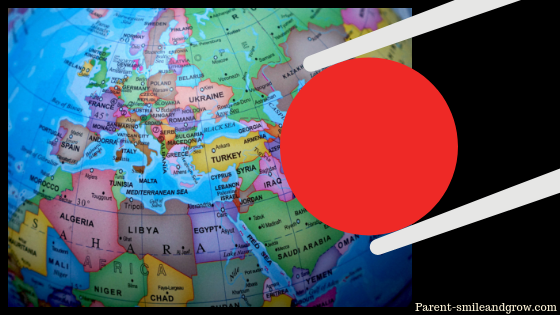
As my friend wants to stay anonymous, I will give her a fictitious name. This is the story of Ichiko, a Japanese woman that a few years ago decided to move to Germany. What seemed like a temporary trip to learn the language, became instead a jump into a new life. New home, new family, and new set of values.. an internal contradiction that came into full force when becoming a mother abroad. But let’s get things in the right order.
Table of Contents
A marriage according to Japanese tradition
Ichiko was born in a small town in the center of Japan, in what she defines as “an old fashioned-style family”. She was the first child for her parents. A few years earlier, when her parents wanted to get married, her father Daiki had to ask permission to his future parents-in-law.
He said “Would you please give your daughter to me?” as the tradition asked for.
Was he nervous when he opened the door, with this ready-made formula in mind? Did he ask his girlfriend Asako before? Was Asako taken into consideration in any step of this process? Was she anxiously watching behind a curtain when her boyfriend came in? Unfortunately, we’ll never know. But if, indeed, there was any emotion, most likely Daiki and Asako had to keep it well hidden in their hearts.
The permission was given, and after the wedding, Asako had to move in with Daiki’s parents. This was, and partially still is, the tradition. Married girls dedicate their entire lives to their husbands; they belong to their new family. Asako made no exception.. You couldn’t imagine doing things differently. Living together without being married; or having a child out of the marriage.. were just unforgivable sins that would have followed the child his whole life as a label stuck on his forehead.
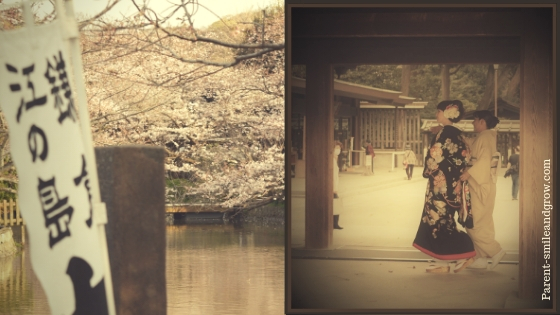
The protector Angel is born
But Asako wasn’t happy in her new life. She had to forget who she was, and find her place into a new home. Daiki, like most Japanese men, was out at work most of the time, so he couldn’t support her as she would have needed. She suffered, he worked.
The savior came under the form of a beautiful, intelligent baby girl, Ichiko. Asako held on to her baby as if she was born to give her back her life. A reason to live. And Ichiko, indeed, was the perfect daughter : responsible, obedient and caring. But she couldn’t stand the role of the protector angel her mother gave her.
Ichiko hated that everything had to be “according to the tradition”. She hated that she had to always be the best to keep her mother happy. She grew up believing that she had to protect her mother.. even though, of course, Asako never asked her to do it and would never admit it. These things install under your skin, without a word being said…

Many cherry trees blossom before the storm
Asako had other two children after Ichiko, a boy, and after a few years, a little girl that Ichiko calls “her daughter” instead of her sister. Because Ichiko felt she’d lost her childhood to mother her whole family.
Everything went on, one cherry season after the next one, without no much fuss. Ichiko kept being the perfect girl, performing well at school, being diligent. But. She wasn’t like the others, like her friends. No, she dared speak the truth. She told her opinion out loud. And never felt understood.
You wouldn’t say certain things; people know this! She would notice everybody’s looks on her, the icy atmosphere after she’d spoke. And started thinking : “This is not my place. I don’t belong here.”
At about that time, things between Daiki and Asako were going worse than ever, until they decided to get a divorce. Ichiko’s hidden feelings exploded into a burning rage against her father.
It’s very common in Japan for divorced fathers to move out and not keeping a regular contact with their children. The mother has usually full custody. So that’s also what happened for Ichiko’s family.
Daiki kept working and working, and Ichiko didn’t want to see him anymore. Her fury was intolerable.
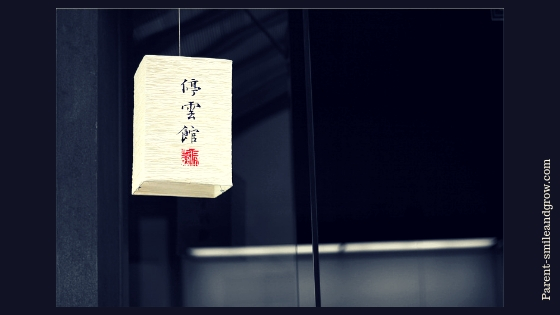
The Angel spreads her wings
But as teenagers do, she managed to leave her past behind her, and moved on. She concentrated on her studies, and went to university. That’s where she started learning German. Japan’s history has many connections’s to the German’s, as we know. But what rebel Ichiko saw, was a Germany which received no or little help after the war, and yet never tried to hide its past and got to a full recovery; whereas her home-country did get helped, but covered all the mistakes it made in the past.
And for some reason, Ichiko felt an inexplicable attraction to this foreign country she had yet never seen, as we all do when we construct a fine picture of expectations out of something we once read about or took a glimpse of.
Ichiko’s professor gave her the final push, first by organizing a one-month-study-trip to Austria; then the following year, a whole nine months internship in Germany. She never went back (except for vacations, just to reassure you!).
When abroad becomes your home
It wasn’t straightforward nor unpainful. As a first flight from the family nest, especially one where we took on the role of the ancillary mother and all-time rescuer, landing on the opposite side of the globe was indeed liberatory but alienating. Even the food has not many points of intersection..
Yet a primitive force nudged her forward, without any other physical signs of distress other than flashes of her iron-willed glances and clenched jaws. Ichiko was used to keep concealed under a cheerful smile her fierce spirit and resilience.
When the internship was over, the company she was working for offered her a fixed contract, so Ichiko stayed.
Did Asako realized at some point that she was somewhat losing her first anchor? Or have she ever blamed her, or finally understood that her daughter’s freely expressed honesty needed a whiter canvas? Did she communicate Ichiko’s life itineraries to Daiki in any way, or was he completely clueless about his offshoot’s accomplishments? We can just picture them, each in their own houses, close to us by their humanity and parental love, their actions yet driven by a different set of values and conditioning.
Becoming a mother abroad and the breech in traditions
Ichiko, inevitably, fell in love too. Attracted by diversity, revolted by what happened to her own mother, she couldn’t have accepted the same experience of a “love according to traditions”. Instead, she lived it the European way, without the permission of her parents as a social requirement. But maybe, she wasn’t thinking about all that. She was simply, profoundly happy and fully accomplished. These instants when we know we don’t need anything else.
They found out they were expecting their first child and got married at about the same time. Asako surely raised her eyebrows at the thought, but couldn’t intervene.
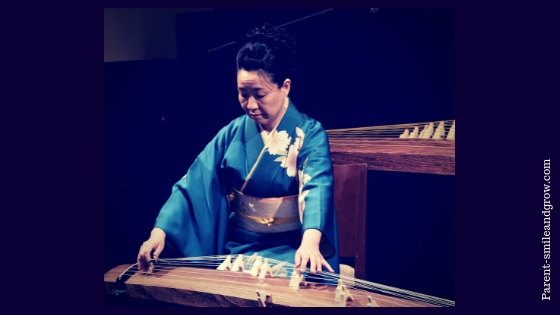
First challenges of pregnancy when becoming a mother abroad
Pregnancy.. for many Japanese women, this means their first visit to the gynecologist. Girls often don’t go before. Ichiko was then faced with her first challenge : she didn’t know what to expect about this.. showing her intimacy to a stranger; a stranger who speaks German, of all things. Didn’t know where to start.
She took the phone and started calling, one doctor after another, following the telephone directory. Just as I did when I was looking for a nanny! I still remember my anxiety, my chest expansion at the thought, and every time I got the “We don’t have any free spot” answer, my anxiousness’s level grew. So I can just picture a disquieted Ichiko, one hand on the phone, one on her belly, fretfully dialing one number and then another, her German suddenly limping.
She wouldn’t say she was pregnant, so nobody would take her. Too many patients. Finally, a friend helped her, gave her the right suggestion, and the meeting was scheduled.
Pregnancy.. for Ichiko, it should have meant a pure expression of her own expectations. That’s what she wanted, it should have been how she pictured it. Because all her life, she lived to perfection. She had to. For her mother, for her own sake.
And she succeeded every time, just as she had planned. Why pregnancy should have been different? Without any other trusted guide, without the gentle, loving presence of another mother in her vicinity, Ichiko went through all the books she could find. In German, in Japanese, it wouldn’t matter.
Pregnancy and perfection
In her inner world, pregnancy was the idyllic achievement of a woman’s sublimity. Let’s face it, all our societies tend to lead us toward this image of the perfectly happy mommy; her fine silhouette except for a predominant belly; always a smile on her face, moving around with gracefulness and no effort.
Well, my personal experience is more fluctuating. You do feel happy of course. But you also feel this contrast between the external pressures and your internal state. Strangers talk to you with savant eyes; everything’s described as “wonderful”.
What about the hormonal imbalances? And the exhaustion that leaves you clueless at 1 pm? Or the alienating sensation of seeing your belly grow, and then move and bump and hiccup, without you being able to master any of this? Most of the time, you don’t know what’s going on inside your own body, and you don’t know whether it should be like this, or it’s just you.
No control. Ichiko was facing this breach between what should have been and what was, and she didn’t like it. It made her overly preoccupied, apprehensive as she never had been.
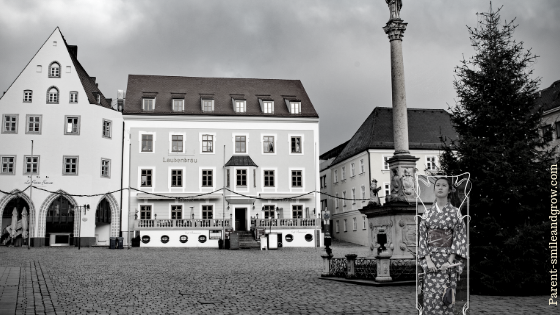
Differences in gestation when becoming a mother abroad
The doctor she’d found didn’t help her much with her distress. There wasn’t any other pregnant woman in the waiting room, which would have been reassuring. No mention to what she should have eaten, how much weight she should have gained.
Did her doctor take into consideration the different build, body type and size when checking the baby’s growth? Or did she just follow her chart in that accurate, meticulous way Germans are famous for? What Ichiko knew, besides her discomfort and continuous attempts to make things as right as she had planned, was that at 37 weeks through her pregnancy, the doctor told her: “Your baby is too little. Maybe we should postpone the due date a few weeks.”
Speechless Ichiko left the doctor’s office in a state of shock. Is changing the due date even something allowed? If there was a fixed, sure point through all her pregnancy, it was (at least) her due date.
Ichiko was shaking and crying when she called her husband, asking him to bring her to the hospital for a double check, as even her doctor had suggested. Luckily, it turned out everything was just fine! When the due date came, at 40 weeks, baby was still happily enjoying the warmth and coziness of her mom’s belly.
This is something that puzzled me a lot during my pregnancies : due dates aren’t the same across countries. It’s 40 weeks in Italy and Germany, but 41 in France for instance. Some count from the last period, some from conception.. I was always very confused.
Due date and getting nervous
And truth to be told, you do get anxious when the due date approaches, and the baby gives no sign of wanting to get out. Ichiko wasn’t an exception, either.
Asako had offered to come and help. Japanese mothers very often take care of their daughters right after they give birth. Many women temporarily move in with their mothers after giving birth, to get some help and support for the first few months. Japanese moms and babies don’t even leave the house the first few weeks, so another dear presence around can really be of use.
But Ichiko refused. Asako couldn’t speak any German nor English, while Ichiko’s husband didn’t speak Japanese. Ichiko wanted to be fully present to her baby, to this major event she was about to live; she didn’t want to spend her time translating for her mother and husband. Another breech in tradition..
So Ichiko was restlessly waiting; a couple of days after her due date, during the visit at the hospital, doctors noticed the cervix had begun to dilate. They suggested she stayed at the hospital, and after a few hours, to induce birth.
Nothing as expected
Pain was sudden and abrupt. It had nothing to do with the regular contractions, to what midwives had explained during the prenatal course. That was intolerable, burning and continuous. It was hard to breathe, or to think about anything else than the invading pain. There wasn’t any comfort nor solace.
Doctors at first recommended, then obliged an epidural. Ichiko didn’t want any : she had firmly believed she would feel and accompany, with every cell, her baby throughout birth. She wanted to master it, to actively contribute. The epidural was done against her will, and the relief was sour.
Time dropped by, and still no baby. Doctors got ready for a Cesarean. Astonishment, refusal in Ichiko’s powerless strength. Then, as they were preparing the operation, “No wait, the baby is getting down, we can give it a try with a forceps!”
I don’t know what’s going on!
Ichiko had an outside her body feeling, as if she was watching the scene from the exterior; that couldn’t be her giving birth. It shouldn’t have been like this at all. Couldn’t believe it.
Her husband was getting ready for the operation, and when he came back in, the scene had switched inexplicably. They’re talking about a forceps? What?
Ichiko couldn’t feel anything, couldn’t push, her baby was taken out. It wasn’t her accompanying the baby through life. That couldn’t be her baby. She didn’t even feel it. What’s this sticky creature they’re holding toward me? What did just happen? Frustration, alienation..
Where was the profound joy and sense of accomplishment she was supposed to be feeling? Where was the maternal awe and loving bewilderment? But there wasn’t any time for bonding, or recovering. Ichiko needed to be taken care of by the doctors.
Daddy held his baby, while Ichiko was left alone. Facing the gulf between giving birth in her inner world and what had just happened.
Expectations when becoming a mother abroad, vs the reality
How was life with a baby you couldn’t properly bond with? Ichiko struggled. That frustration reminded her that it wasn’t as she had imagined; it was contracting her from the inside.
That was the moment where she felt as strongly as ever : “I don’t want to be like my mother!” We all feel that way once in our life. When our individuality wants to break free from our parental conditioning.
Ichiko still had to face this, before she could fully accept who she was. Where she comes from, is also part of her. Also part of her baby. Something she couldn’t change, no matter where she’d go.
Ichiko went back to work. Because she loved her work. In Japan, she maybe wouldn’t have. If you’re financially safe, you’d quit, to stay fully at home taking care of household and children.
And she also decided to see a therapist. As she was struggling with the acceptance of her own natural imperfection; as she was taking in her new maternal role, discovering what kind of mother she was being; she started thinking about her dad. A dad she hadn’t seen in 18 years.

Reconnecting with your origins
For some reason, for the sake of her own child, she needed to know. By the time she became a mother once more, Ichiko sent a letter to Daiki’s office. She put into words her whys, her past anger; her present too. She released a ball of entangled feelings that had remained intact, hidden and untouched for 18 years.
Months went by without a word in return. Then, an email. Daiki was surprised, but pleased to be in contact with his daughter.
That day, he had come into his office a little late. He’d had a doctor appointment. The visit didn’t go as planned. Daiki was diagnosed a cancer, terminal phase. He went back to work, because things had to get going anyways, it was his duty. But life was gaining a new meaning.
Defeated or savoring every tiny bit of the air he could suck in, he saw a letter on his desk. Coincidence or magic trick of life?
In the private space of his office, maybe he let the new turn of his perspectives flow. Maybe he let tears clean his thoughts. Or maybe, he kept this all in.
It took him months to find the words to define all this, and to give it an answer.
There was still enough time to meet. Still enough time to meet his grand-children. Hold hands. Smile. Let his feelings out, caress, touch and soothe, if not through words. Acceptance, before letting all go.
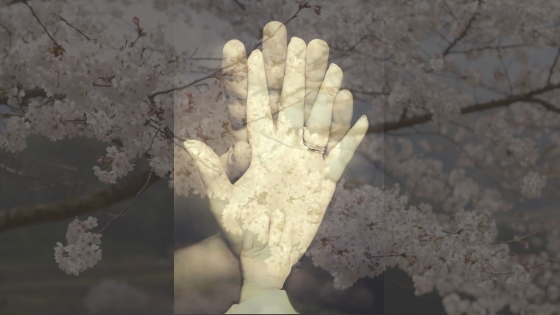
Learning inclusion and acceptance when becoming a mother abroad
Now, Ichiko’s children also have to face the non belonging to just one specific case. Partly European, partly Japanese. It’s a gift, and also an exception. An enlargement of traditions, cultures, history teaching us we’re not just one thing. We’re an ever changing kaleidoscope, and that’s ok!
You know, when I was preparing my interview to Ichiko, I was focusing on the cultural differences. How was it difficult or challenging or funny to see how things can be done in a different way.
I’ve ended up with a universal story : of accepting who we are, our past and present. Of facing our imperfections. Also, of discovering that life doesn’t always go as we plan, and that doesn’t make us bad or wrong. It’s the story of many women’s pregnancies, when the new person we carry pushes us to look within ourselves.
Acceptance, and then, love. Thank you, Ichiko, for accepting my interview. For letting me put your story into my own words, and being willing to share it with the world.
If Ichiko’s story touched your heart, please share it with a friend! We’d be happy to read your comments too 🙂 [social_warfare buttons=”Facebook, Twitter”]
Don’t miss another incredible, touching story : Razan had to leave Syria, but has never stopped fighting for women, children, minorities, a better world.. and now raising a wonderful child.
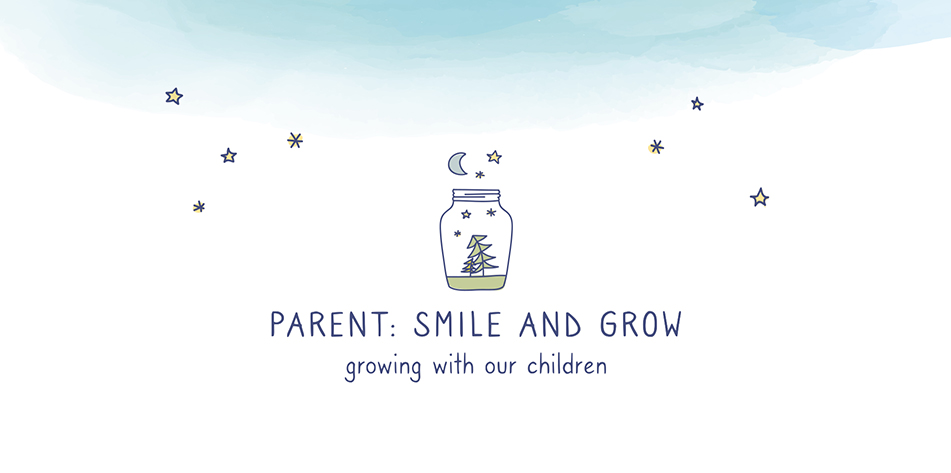
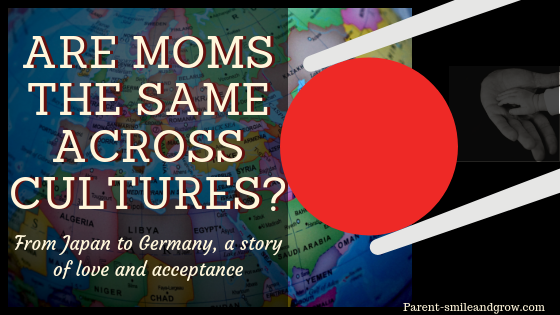
Pingback: Warning : this Amazing Story of a Syrian Mother may truly Inspire You.